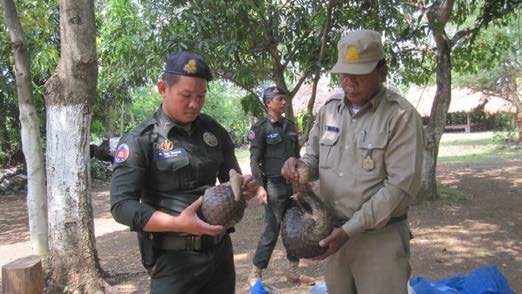By Jessie Knierim | Development Associate
The Wildlife Rapid Rescue Team (WRRT) team manager has been conducting investigations in Poipet and Banteay Meanchy on the Cambodia Thailand border, where there is a lot of trade to and from Thailand. Operations on borders are often unsuccessful due to complicity and corruption of border guards and officials. However, at the beginning of August, the team conducted two successful operations here, confiscating 2 pangolins, snakes and 170 snaileating turtles. The offenders were placed in detention pending trial and the turtles and snakes were released. The pangolins were transported to our Wildlife Release Station in Koh Kong.
839 animals were release by the WRRT during the past three months. 681 of these, mostly birds and turtles, were immediately release d by the team following confiscation. 137 pythons, 7 cobras and 24 longtailed and pigtailed macaques came from PTWRC following a time of care. The team prefers to release cobras immediately, but it is not always easy to find an appropriate area to release these dangerous snakes and they usually end up in our own protected area, the Southern Cardamom Mountains in Koh Kong.
During the past 3 months, the WRRT rescued 826 live animals, confiscated 510 dead animals, conducted 194 operations, and arrested 24 wildlife traders.
By Jessie Knierim | Development Associate
By Jess Knierim | Development Associate
Project reports on GlobalGiving are posted directly to globalgiving.org by Project Leaders as they are completed, generally every 3-4 months. To protect the integrity of these documents, GlobalGiving does not alter them; therefore you may find some language or formatting issues.
If you donate to this project or have donated to this project, you can receive an email when this project posts a report. You can also subscribe for reports without donating.
Support this important cause by creating a personalized fundraising page.
Start a Fundraiser